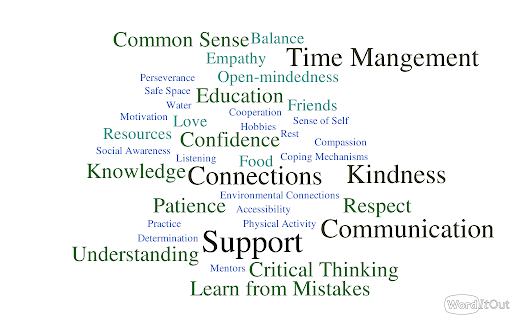Part 2: How to Human (Effectively!) 101
Learning Objectives
By the end of this section, you will be able to:
- articulate skills and knowledge that it takes to be a human being.
- begin to consider where in the general education curriculum those skills and knowledge might be addressed.
Activity 2.2

- Imagine you are enrolled in a class called “How to Human (Effectively!) 101.” The description on the syllabus reads:
In this course, we will discuss and identify what a person needs in order to “human,” and, more importantly, what a person needs to “human” effectively, not just to live or survive, but to manage a high quality of life that leaves the world better than we found it. Our discussions will range from the physiological to the cognitive to the social and beyond.
- By the end of the semester, what do you think would be on a list of what we need in order to “human effectively”? Create your own list.
Discussion 2.2
During the summer of 2022, Fitchburg State University student ambassadors, including Orientation Leaders, Peer Tutors, and TRIO Student Support Services Squad Leaders, completed training on the General Education Program. In that training, like you, they were asked to list everything we need to “human effectively.” The following word cloud represents their collective responses (please note that larger words indicate multiple individuals gave the same response).
- Analyze this word cloud. Are the responses you gave in the cloud? What would you add? Would you take anything out?

- After analyzing the word cloud and comparing it to your list, think about how a student might gain these necessities while taking general education courses. What requirements might develop these types of skills and knowledge?
Note: later, in Chapter 3, we will explore specific examples.
Media Attributions
- How to Human 101 © Kisha Tracy via. Fitchburg State University is licensed under a All Rights Reserved license
- Word cloud © Kisha Tracy is licensed under a CC BY-NC-SA (Attribution NonCommercial ShareAlike) license

